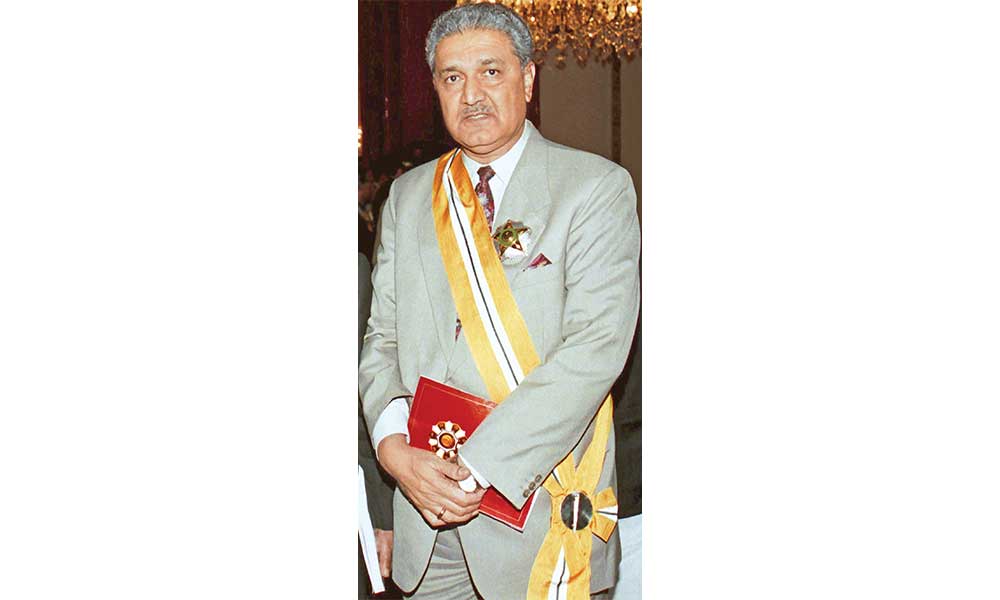FINAL GOODBYE
- 23 Dec - 29 Dec, 2023
What is there to say about a career in which you win all the major awards in your field and the accolades you garner come from highly esteemed peers, presidents and other world leaders, celebrities from the sports and entertainment industries, and students of all ages? What is there to say about a life that was shared with a beloved wife of 58 years, much of it in a beautiful house in which they raised two daughters? What is there to say about a man whose discoveries altered the course of history, immortalised his name among the national heroes of Pakistan and in the archives of the Nobel Prize Awards?

Dr Abdul Qadeer Khan, known as the father of Pakistan's atomic weapons programme, has recently tragically passed away, after being hospitalised with Covid-19. The news was carried by every major newspaper and channel in the country.
Abdul Qadeer Khan, born on 1 April 1936, was an émigré from India and belonged to a family of Pashtun origin. After his matriculation from a local school in Bhopal, in 1952 Khan emigrated from India to Pakistan. Upon settling in Karachi with his family, Khan briefly attended the DJ Science College before transferring to the University of Karachi, where he graduated in 1956 with a Bachelor of Science (BSc) in physics with a concentration on solid-state physics.
In 1962, while on vacation in The Hague, he met Henny – his wife. In 1963, he married Henny in a modest Muslim ceremony at Pakistan's embassy in The Hague. Khan and Henny together had two daughters.
In 1967, Khan obtained an engineer's degree in materials technology and joined the doctoral programme in metallurgical engineering at the Katholieke Universiteit Leuven in Belgium. In 1972, Khan successfully graduated with a DEng in metallurgical engineering.
His professional and educational achievements abroad are wide ranging, but his career in Pakistan is substantial too. AQ Khan first decided to contribute his efforts in building an atomic bomb for Pakistan when he learned of India's surprise nuclear test, 'Smiling Buddha', in May 1974.
I never had any doubts
I was building
a bomb. We had to do it.
Throughout his journey of establishing nuclear devices, Khan had faced much obstacles and criticism. But in defiance of it all, Khan continued his resilient efforts to make Pakistan world’s first Islamic nuclear power. And finally, with the assistance of China’s implosion bomb design, a Pakistani atomic bomb was soon a reality. On May 28, 1998, Pakistan detonated its first nuclear devices using bomb cores built by Khan. As he declared after the successful tests, “I never had any doubts I was building a bomb. We had to do it.”
Although, Khan was accused of having a nuclear proliferation network. And in February 2004, Khan even publicly admitted to selling nuclear materials on the black market and offered his “deepest regrets and unqualified apologies.” For this, Pakistani officials placed Khan under house arrest. But soon in 2009, he was released.
Despite his controversial career, AQ Khan has been one of the most widely known and recognised scientists in the field of nuclear physics and metallurgical engineering and he has been a leading personality throughout his career. He had significantly contributed to the advancement of nuclear science and technology, and security in Pakistan. His scientific production is really immense, spanning from deep theoretical aspects, experimental investigations all the way to practical applications. He has received several awards and prizes for his scientific achievements (e.g. two Nishan-e-Imtiaz, Hilal-e-Imtiaz and 45 gold medals and three gold crowns).
AQ Khan was a distinguished nuclear scientist, the one who unleashed nuclear weapons into Pakistan and made this country an atomic power for the first time on May 28, 1998. AQ Khan was an exceptional human being. He believed that science and the future of humankind are inextricably linked. All his life, he served science and acknowledged its incalculable benefits to civilisation. To know him at all, or to know about his life is to recognise that AQ Khan was truly a man in full. His death is a great loss to our nation and his absence in this world leaves a void that will never be filled.
–Editorial Desk
COMMENTS